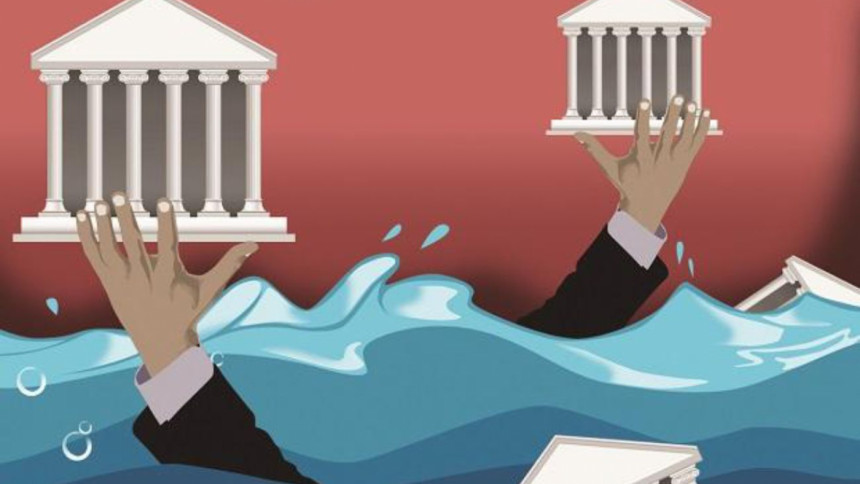No negative reporting, please!

Maternal uncle, or mama, is an affectionate character in the lives of Bengalis. A typical mama is expected to indulge every whim of his nephews and nieces. And that is why we got a term in Bengali literature—Mamar Barir Aabdar—which refers to a big demand placed to a kind-hearted uncle only. The way the bank owners are asking the government for one undue favour after another is reminiscent of this very notion. In recent times, this has reached a ridiculous level as they are demanding that the government make a rule prohibiting any "negative" reporting against their activities. Essentially, what they are asking for is an act that will force the media either to report nothing on any of their wrongdoings or to report everything in a "positive" light. If such a whim is indulged—we hope for our economy's sake that it will not be—major financial scams will sound like a "growth-supportive act of patriotism".
The bankers' behaviour reminds us of the history of Pakistan where the 12 most influential families would have industrial laws passed in their favour by convincing the military dictators. But such a demand—or Aabdar—to control the media is unprecedented. The Bangladesh Association of Banks (BAB), an alliance of bank directors, submitted a nine-point proposal to the finance minister in March this year. It came in the wake of media reports that the top brass of several private banks was involved in some high-profile loan scams.
As a teacher of economics, I frequently use the word "negative" to mean an inverse relationship between the price and the quantity demanded. But after the move of the directors, I am curious to see what their definition of "negative" entails: it probably implies that the journalists can report all the good achievements such as profit growth, return on assets, and credit expansion, but the media will be gagged once it reports on the financial scams, money laundering, wilful default, and cronyism of the private bank directors. Although any sensible administration would trash this type of unethical demand instantly, we won't be surprised if the finance ministry agrees to comply with it.
Since early 2016, Bangladesh has entered a new era of central banking that paved the way for a miserable loss of banking governance and an ever-growing amount of default loans. Classified loans came down to as low as six percent in 2011, but they suddenly reached 10 percent during the tumultuous year of 2012. The then Bangladesh Bank Governor Dr Atiur Rahman was able to bring them down to 8.79 percent in 2015. Following his resignation, however, classified loans began to rise again since early 2016, eventually reaching close to 11 percent in 2017—a pace totally contradictory to the economy's output growth. This is indicative of weak governance and unproductive leadership of the central bank and has nothing to do with the economic cycle.
But the story will remain incomplete if we don't recall what else has happened since then. The finance ministry eclipsed the central bank, appointing a governor who would be too obedient to say "no" to anything the ministry deems right even from a political consideration. The finance minister's priorities put the main task of the ministry—i.e. to address fiscal incapacity—in the back seat. The banking sector turned from bad to worse not only in terms of default loans, but more importantly, other gains in macroeconomic stability also began to erode. Export growth fell far short of import growth, remittances began to fall, forcing current account balance plunge into deficits from surpluses. Growth in foreign reserves stunted, making the exchange rate deteriorate and thus contributing to inflation, because importable goods became more expensive domestically.
Most importantly, the central bank's inaction and the finance ministry's excessive indulgence encouraged "professional defaulters" to continue with their work, upsetting the whole industry.
Now if some of the bank directors happen to be among those professional defaulters, how does BAB expect the media to handle the case? One way is not to report anything about it. Will that reflect any work ethic for the media which is responsible for letting the innocent depositors know what is happening inside the banks where they have put their money? So, the media has to report it anyway for the greater national interest. My humble suggestion would be that BAB arrange a national workshop to train journalists on how to convert "negative reporting" into a positive one! BAB needs to create new jargon so "negative profit" can be termed as "optimistic profit." Also, if Director X has defaulted a loan of Tk 1,000 crore, the media should add a positive note by saying: Director X has done a great job by not paying back Tk 1,000 crore to the bank because he needs the money to support his staff, thus serving the greater interest of the nation. (Tk 1,000 crore is a little amount in comparison to our huge GDP of Tk 2,000,000 crore.)
Now, say, Director Y has laundered Tk 2,000 crore. The media should report it as: Director Y has successfully "remitted" Tk 2,000 crore in different developed countries to increase Bangladesh's stakes internationally and also to help the nation understand the process of globalisation. In the event of the increasing number of directors from one family in a bank, the media should report: Directors are caring for the bank as if it's their own baby and thus increasing family participation to ensure greater security of the institution and welfare of the nation. If BAB can make such guidelines and submit them to the government, the finance ministry is most likely to make it into law, entitled, "The Negative Reporting Prohibition Act 2018." The central bank will welcome this as a new circular and follow it blindly!
Biru Paksha Paul is an associate professor of economics at the State University of New York at Cortland. Email: birupakshapaul@gmail.com






Comments